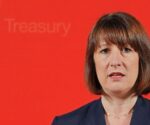Cash ISA ‘tax grab’ fears erupt as Rachel Reeves tipped to make huge £10k change in Budget | Personal Finance | Finance
Rachel Reeves has been tipped to slash the cash ISA allowance in her upcoming Autumn Budget, with one expert labelling the potential move a “tax grab”. The Chancellor could reduce the amount people can save tax-free from £20,000 to £10,000 in a bid to inject more money into the UK’s dwindling economy.
Ms Reeves will attempt to fill an estimated £30 billion fiscal hole in her Budget on November 26. By slashing the cash ISA allowance in half, she is hoping to encourage savers to divert money into the stock market and boost the economy. However, industry experts believe the move will have “unintended consequences” while there is no guarantee that money will be re-directed towards businesses.
As reported by This is Money, a Treasury spokesman said: “Cash savings are important for people looking to put cash away for a rainy day and we will protect that. But the Chancellor has been clear that she wants to get Britain investing again, so British companies can grow and British savers who choose to invest can get more in return.”
Rob Mansfield, Independent Financial Advisor at Tonbridge-based Rootes Wealth Management, told the Financial Times: “This looks like nothing more than a tax grab. My experience is that lots of people only think about cash ISAs, rather than stocks and shares ISAs and so if the limit is reduced, we’d likely see cash held where the interest is taxed.
“If the government are serious about wanting people to invest then tell people of the benefits and rewards of long-term saving rather than trying to force them into investing for nationalistic reasons.”
Meanwhile, Luke James, Tax Director at Gravitate Accounting, said the move could have consequences as Stocks and Shares ISAs involve more “volatility” than savings.
He explained: “The Chancellor’s proposal to cut the annual Cash ISA limit from its long-standing £20,000 risks unintended consequences. After nearly a decade without inflation adjustment, any sudden change could appear punitive to cautious savers and weaken trust in fiscal policy.
“While Stocks and Shares ISAs offer higher potential returns, they involve volatility and assume a level of financial literacy not shared by all. Many prefer Cash ISAs for their simplicity, security, and tax efficiency, reducing the limit may push savings into taxable accounts rather than equities, undermining the policy’s intent.
He added: “Though the measure may boost tax receipts, it will mainly affect higher earners already contributing to the economy. With the British ISA scrapped, there’s no guarantee redirected funds will support UK businesses. Without broader incentives, education, and a clear long-term investment strategy, the reform risks short-term gains at the expense of lasting confidence and growth.”
The Chancellor was expected to slash the allowance in July but the plans were put on hold after a furious backlash from savers. Building societies warned that they used cash ISAs to fund mortgages and that restricting the allowance could drive up the cost to borrowers which could be passed on to homeowners.
Andrew Gall, head of savings at the Building Societies Association, said: “It is really concerning that Rachel Reeves is still considering cuts to the cash Isa limit.
“We absolutely support the calls for more people to invest, especially in the UK. Cutting the cash Isa limit simply won’t achieve that aim. Starting to save is a crucial part of the journey to investing.”
Cash ISA savers can currently put away up to £20,000 a year with all the interest earned on savings being free from tax. They can choose whether to invest into the stock market via a stocks and shares ISA or hold it as cash, or a combination of both.
However, Ritesh Sood, CEO & Founder at London-based Soul Mortgages, said the move to cut the allowance to £10,000 could actually have positive results. He added: “While the potential reduction of the Cash ISA allowance has sparked debate, it could ultimately guide the public towards a more robust, diversified savings strategy.
“The Government’s objective is to stimulate the UK stock market by channelling more capital into investments, which could potentially flow directly into UK businesses. For those seeking greater security within a Stocks and Shares ISA, lower-risk options like money market funds or government bonds can provide a level of capital preservation closer to cash, though not identical.”








